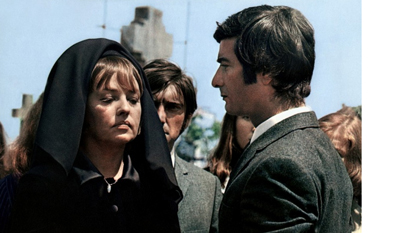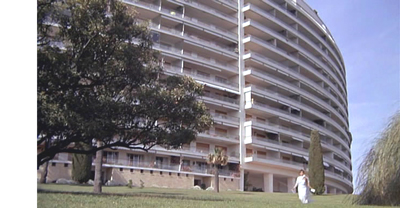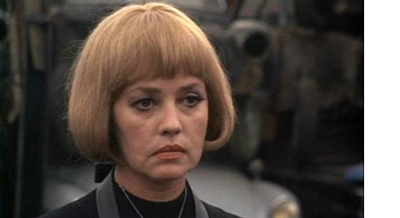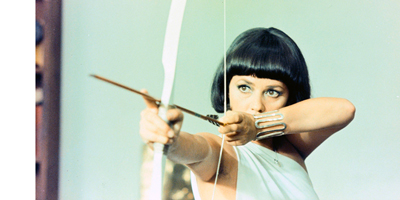
 |
|
|
|
François Truffaut made other films emulating the thrillers of Alfred Hitchcock, but his Mississippi Mermaid and The Bride Wore Black are the ones that seem directly influenced by the long audio recording sessions the critic-director undertook for his Hitchcock interview book. Both are based on stories by pulp noir specialist Cornell Woolrich, and Bride is graced with a music score by Hitchcock's most accomplished musical collaborator, Bernard Herrmann. Twilight Time's founder-producer Nick Redman worked for years producing soundtrack music for studios; besides being an expert, he's a fan. Ergo an extra on this special limited edition disc is a bonus CD of The Film Music Society's special 'unvarnished chat' with Herrmann. 
Guns, knives, poison: The Bride Wore Black is a classic annihilating melodrama about cold-blooded revenge. On the surface it's a 'woman scorned' story shorn of psychological depth, personal diary of serial homicide. A couple of flashbacks explain why Julie Kohler (star Jeanne Moreau) is intent on murdering five men she's never personally met, but instead of exploring the whys and wherefores, Truffaut just lets us watch as Julie crisscrosses France by train, picking them off one by one. 'Black widow' Julie is a brilliant hit-woman. She knows how to approach every man, and how to leave no footprints behind her -- no clues, no witnesses. Mostly though, her success rate is high because she's utterly committed to her mission. With her mask-like face, Jeanne Moreau is adept at concealing her feelings. She flatters and seduces each of her targets from a different angle. Neither Julie nor Truffaut waste time with pity for the victims, five pretty dismal examples of manhood. Although none deserves to die, none are particularly endearing. All but one imagines Julie's calm attitude as a green light for conquest. A narcissistic ladies' man is ready to slip away with her right in the middle of his wedding reception. An unpleasant milquetoast repeatedly remarks on his incredible luck, when it should be obvious that Julie's up to no good. A pompous politician thinks he's meeting his son's teacher, and accepts her odd willingness to help him cook dinner as a droit du seigneur. The fourth target is an access problem; Julie has to skip over him to get to target five, an artist with a harem complex of his own. 
Truffaut eventually interrupts the proceedings to hit us with dramatic flashbacks of the 'murderous accident' that motivates Julie's killing spree. She loses her husband immediately after the wedding ceremony as they're descending the steps of the church. We see an idealized vision of Julie's childhood, and a flashback view of how the deadly accident occurred. It doesn't matter that none of the men meant to kill. Their common interests are 'hunting and women'. Like a mythological harpy, Julie will run them all down. She's decided that she's already dead, that losing her love has transformed her into an angel of death. The victims are a gallery of cads and fools. Handsome Claude Rich (Je t'aime je t'aime) and Jean-Claude Brialy Le Beau Serge are the skirt chasers that boast of their many conquests; each seems to think he can talk any woman into bed in a matter of minutes. Michel Bouquet Malpertuis is the (presumed) virgin bachelor in a shabby apartment; for him Julie plays the role of an anonymous admirer, his dream come true. Politician Michael Lonsdale Munich assumes that everyone should be his servant, and puts out insulting hints that Julie can worship him too. The artist Charles Denner "Z" keeps a flow of beautiful models on tap. Julie doesn't give the playboy any slack for appreciating her beauty. Objectification is objectification. Denner dresses Julie as Diana, the goddess of the hunt, and even arms her with the murder weapon. It's all too appropriate: the man creates his own poetic destroyer. 
The Bride Wore Black comes off as something that Hitchcock might have made had he felt the freedom to be less commercial. Perhaps he recommended the story to Truffaut during their interview sessions. It's really cold-blooded. Truffaut lets us enjoy Julie trapping and killing guys, most of whom are guilty only of being male. She plays with the politician's son as a way of getting into his house, caring not that she's about to deprive the kid of a father. After all, a boy is just a worthless man in larval form. Julie does take pity on a woman (Alexandra Stewart) that she accidentally implicates in one of the murders. We root for Julie without knowing exactly why. In 1968, blind female revenge against men is a fairly progressive idea... but by objectifying Julie as a semi-mythical messenger of death, it can be argued that the show is still vaguely misogynistic. Quite a bit of Truffaut's film is dialogue free, which allows composer Herrmann to run wild with his music. It's not the triumph that is his score for Fahrenheit 451, but it's an excellent fit for this parade of killings. The first audio heard is the noise of a photocopier printing out, but Herrmann's nervous music is soon providing transitional passages and accents for some of the violence. For the flashback, the Wedding March on a church organ transforms into Herrmann's heavy notes of utter sadness and desolation. The stylization is complete when Moreau, instead of wailing in horror, just stares serenely at her fatally wounded beloved. 
Truffaut's filming style avoids heavy contrasts in the day. Daytime rooms are brightly lit and flat; Raoul Coutard's color camera works with subdued hues. Julie fittingly wears outfits of stark black and white. Truffaut uses his zoom lens quite a bit, but also goes in for strong compositions (Julie running from the tall apartment building) and flattering images of his star. His understated finale is an amusing surprise -- Julie Kohler's career in crime seems to be finished, but she has other ideas. The Twilight Time Blu-ray of The Bride Wore Black is an accurate representation of this color feature, with an excellent, clean encoding of Coutard's often pale & pastel images. Truffaut's theme is jet black but the look is definitely not noir. Relatively few sound effects interfere with Bernard Herrmann's music, which can be heard on a discrete Music & Sound Effects Track. The trailer included is an American travesty that would put off most film fans; I remember art-house habitués laughing at some of the klunkier trailers concocted by American distributors. This one replaces Bernard Herrmann's music with overly dramatic canned suspense cues. Commentary guest Steven C. Smith is a great choice, as he's a biographer of composer Herrmann. He and Julie Kirgo put forward a good argument against Bride as a Hitchcock derivative. Smith's comments inform us that Truffaut and Herrmann had major differences on the score. Herrmann scored more scenes with heavy cues to emphasize the dark theme. Truffaut dropped many of them in favor of lighter, more ironic music. We also learn that no copy of the original sessions still exists. Julie Kirgo's liner essay is yet another accurate and informative distillation of the essence of Truffaut's murderous, poetic picture. She's particularly adept at identifying classical allusions. 
The long interview on the extra CD gives us Bernard Herrmann in a talkative, engagingly argumentative mood. He talks about his film work and the experience with Hitchcock on Torn Curtain, but we also hear his opinions (he's never at a loss for those) on art and music and other composers he admires. The interviewer probing induces Herrmann to answer most of questions directly... we learn that it took him five weeks to compose the score for Psycho. Final shot: I presume the cover art is adapted from advertising materials? It looks great.
On a scale of Excellent, Good, Fair, and Poor,
The Bride Wore Black Blu-ray rates:

Reviews on the Savant main site have additional credits information and are often updated and annotated with reader input and graphics. T'was Ever Thus.
Review Staff | About DVD Talk | Newsletter Subscribe | Join DVD Talk Forum |
| ||||||||||||||||||